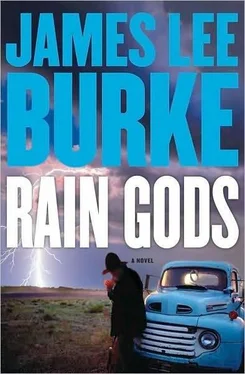“Did you see any strange guys around y’all? Like somebody watching or following y’all?”
“No. What strange guys? I thought all that stuff you were worried about was over. Where’s Mom?”
PAM TIBBS AND Hackberry Holland drove in their borrowed cruiser on a winding two-lane road that followed a dry creek bed bordered by cottonwoods that were bending hard in the wind, the torn leaves flying high in the air. To the east they could see irrigated ranchland and a long horizontal limestone formation that resembled a Roman wall traversing the bottom of a hill. The cruiser was shaking in the wind, grit and the needlelike leaves of juniper trees ticking against the windshield. They entered what appeared to be another domain, one that was dry and cluttered with brush and spiked plants and thick tangles of undergrowth, one that seemed abandoned to Darwinian forces, all of it surrounded by huge wire-mesh game fences of the kind one sees along highways in the Canadian Rockies.
“Shit, what was that?” Pam said, her head jerking sideways at something they had just passed.
Hackberry looked through the back window while Pam drove. “I think that’s called an oryx or something like that. I’ve always had a fantasy about these places. What if the patrons were allowed to hunt one another? The fences could be electrified, and the boys could go inside the fences with three-day licenses to blow one another all over the brush. I think there’s a lot of merit to that idea.” He heard her laughing under her breath. “ What? ” he said.
“God, you’re a case,” she said.
“I’m supposed to be your administrative superior, Pam. Why is it I can’t adequately convey that simple concept to you?”
“Search me, boss.”
He gave up and remained silent as they continued down the road, the cottonwoods and pebble-strewn creek bed gone, the terrain one of twisting arroyos, brush-covered hills, and flat expanses of hardpan where trophy animals as diverse as bison, elk, gazelles, and eland grazed. It was a surreal place sealed off by hills that seemed to suck light into shade, lidded by clouds that were as yellow and coarse as sulfur.
“I’ve got to tell you something,” Pam said.
He continued to look out the window and didn’t answer.
“I think sometimes you go to a place inside yourself that isn’t good. I think that’s where you are now. I think that’s where you’ve been all day.”
“What place might that be?”
“How can anyone know? You never share it with anyone, least of all me.”
He stared at her profile for a long time, somehow thinking he could force her to look him squarely in the eye, to make her admit the nature of her assault on his sensibilities. But she was unrelenting in her concentration on the road, her hands set in the ten-two position on the wheel.
“When this is over-” he said.
“You’ll what?”
“Take you out for dinner. Or give you a few days off. Something like that.”
She closed her eyes for a second, then opened them as though com ing out of a trance. “All I can say is I have never in my life met anyone like you,” she said. “Absolutely no one. Never.”
They went around a curve and saw an archway over a cattle guard and, at the end of an asphalt driveway, a two-story log building with a peaked green metal roof. The logs in the building had not been debarked and, over the years, had been darkened by rainwater and smoke from wildfires and gave the rustic impression characteristic of roadside casinos and bars along western highways. The American and the Texas state flags flew on separate metal poles at the same height in front of the building. A pile of deer antlers and what looked like cattle bones was stacked like a cairn by the arch, an incongruous strip of red ribbon blowing from the eye socket of a cow’s skull. An SUV and two new pickup trucks with extended cabs and oversize tires were parked by the building’s front porch, the paint jobs freshly waxed and powdered with dust from the storm. Every detail in the picture seemed to tell a story of some kind. But there were no people in sight, and once again Hackberry was reminded of the paintings of Adolf Hitler, who could draw every detail in an urban setting except human beings.
“Slow down,” Hackberry said.
“What is it?”
“Stop.”
Pam pressed softly on the brake, her eyes sweeping the front of the building and the terrace on one side and the outdoor tables that had been inset with umbrellas. Hackberry rolled down his window. There was no sound anywhere except the wind. No lights burned in the building except one deep inside the entrance. None of the umbrellas inset in the outdoor tables had been collapsed in advance of the windstorm, and three of them had been blown inside out, the fabric feathering around the aluminum supports. A saddled horse grazed on the back lawn, dragging its reins, its droppings fresh and glistening on the grass. One stirrup was hooked on the pommel as though someone had pulled it out of the way to tighten the cinch and been interrupted in his work.
“Look at the woodpile by the fence,” he said. “Somebody was splitting wood and dropped his ax on the ground. That lawn is like a putting green, but somebody is letting his horse download on it.”
“It’s Sunday. Maybe they’re drunk.”
“Pull up to the door,” he said.
“You want me to call for backup? We can cancel it if we have to.”
“No, you go around back. I’ll go through the front. Don’t come inside until their attention is on me.”
“Why?”
“Because I said so.”
She cut the ignition and walked around the side of the house, her khaki shirt tucked in her jeans, her right hand resting on the holstered butt of her.357. In that moment, details about her caught his eye in a way they never had before: her rump tight against her wide-ass jeans, the wedges of baby fat on her sides, the thickness of her shoulders and the perfect symmetry of her upper arms, her round breasts pressed against her shirt, the way her mahogany-colored hair with its curly tips lifted in the wind and exposed her cheeks.
Pam, he thought he heard himself say. But if he spoke her name, it was lost in the wind.
The front door was already ajar. He set his hand on his revolver and eased the door back on its hinges. He found himself inside a dark foyer, one lined with brass coat hooks on which there were no coats. Farther on, he could see a large living room with a stone fireplace and hearth and a chimney made from stacked slag, and heavy oak tables and dark leather-covered stuffed chairs. In back were a dining room, a long table set with silverware and plates and glasses, and a kitchen that was filling with smoke and the smell of charred meat.
Off to the right of the foyer was a lounge area, the French doors at the entranceway hanging slightly open. Through the glass, he could see the heads of trophy animals mounted on the walls, the bar top wiped clean and shining, the bottles of whiskey and Scotch and gin and vermouth sparkling with the multicolored reflection of light from an antique Wurlitzer jukebox.
He pushed back one of the French doors and stepped inside the room. Somewhere in the shadows, from one corner of the lounge, he could hear an erratic sound like a hard object on a string knocking against a piece of wood. He removed his.45 from its holster and cocked the hammer, the muzzle still pointed at the floor.
A shaft of light burst through a rear hallway, and Hackberry realized Pam Tibbs had just come through a back door and was walking toward the lounge, gripping her.357 in both hands. He held up his palm so she could see the light reflect off his skin. She stopped and waited, her weapon pointed upward at a forty-five-degree angle.
The smoke from the kitchen was seeping into the lounge, the stench of burned meat different from any he could remember. Then he saw the shell casings on the floor, all.45-caliber, ejected in such profusion they could have come from only one type of weapon.
Читать дальше












